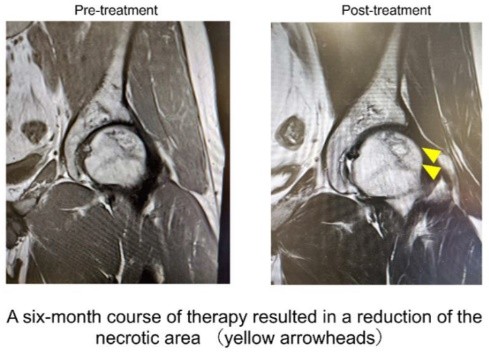Advantages
- New drug therapies for unmet medical needs
- Expanding the indications or repurposing anti-sclerostin antibody drugs
Current Stage and Key Data
Clinical research stage
- Clinical research: Prospective clinical studies are underway. To date, an approved anti-sclerostin antibody drug has been administered to three patients with femoral head necrosis, with two of them achieving favorable results (prevention of necrosis and improved bone mass).
- Mechanism research and non-clinical research: When anti-sclerostin antibodies were administered to a mouse model of ischemic necrosis, activation of Wnt/β-catenin signaling and inhibition of IL-6 increase were confirmed, and bone necrosis and bone collapse were suppressed.
 |
Partnering Model
Seeking exclusive license partners
- Potential partners include biotech/pharmaceutical companies focused on anti-sclerostin antibody drug development, drug repositioning, orthopedics, or rare diseases.
Background
Idiopathic osteonecrosis of the femoral head (ONFH) is avascular necrosis of the femoral head, which leads to collapse of the femoral head and osteoarthritis of the hip. Although it is a rare disease with an incidence rate of about 2 cases per 100,000 people, it is a social problem because it is most commonly seen in young and middle-aged people and causes a significant decrease in QOL, such as orthostatic gait disorders. It has been suggested that the disease is related to lipid metabolism disorders, thrombosis, and trauma, but the details are unknown. There is no drug that can improve necrosis, and the only treatment available at present is surgery. Total hip arthroplasty is performed in more than 80% of patients under the age of 60, but the treatment outcomes of total hip arthroplasty in younger patients are not very good. Femoral head necrosis is asymptomatic at the time of bone necrosis, but when the femoral head collapses, symptoms such as hip joint pain, lower back pain, knee pain, and buttock pain appear. Since QOL is good if bone collapse can be avoided, there is a need to develop conservative treatments that can prevent the progression of bone collapse and preserve the femoral head.
Anti-sclerostin antibodies are clinically used as drugs for osteoporosis. They are known to promote Wnt/β-catenin signaling and inhibit osteoclasts and promote osteoblasts.
Principal Investigator
Yasuhiko Takegami (Nagoya University Graduate School of Medicine, Tokai National Higher Education and Research System)
Reference
- Paper: Ozawa et al., Bone (2024) 181:117030.
- Patent: PCT application pending
Project ID:BK-04700b


